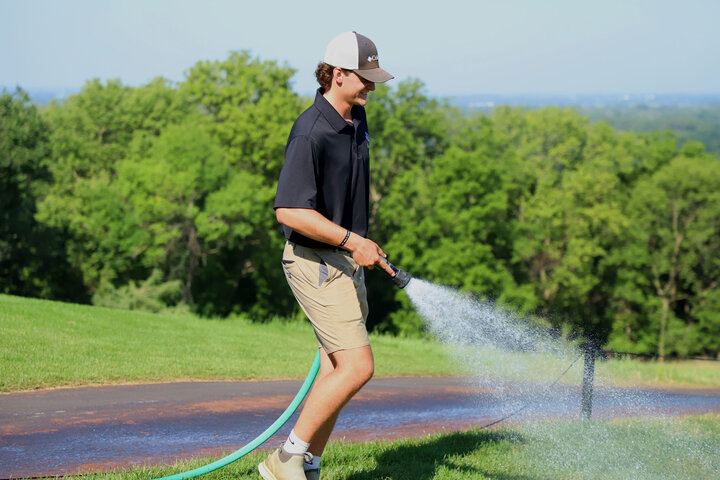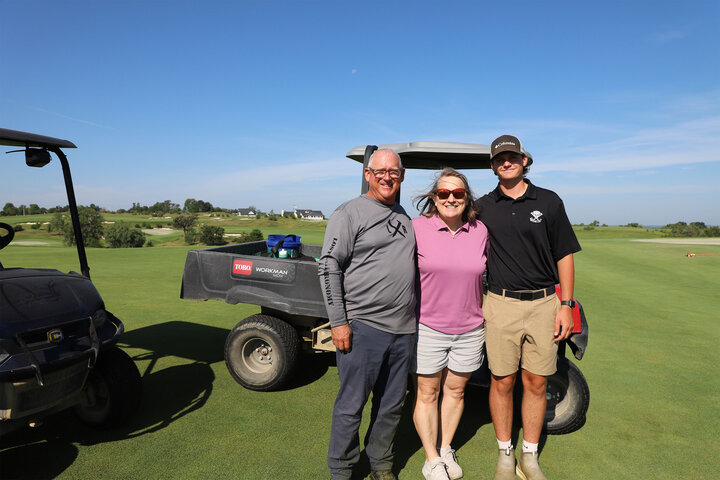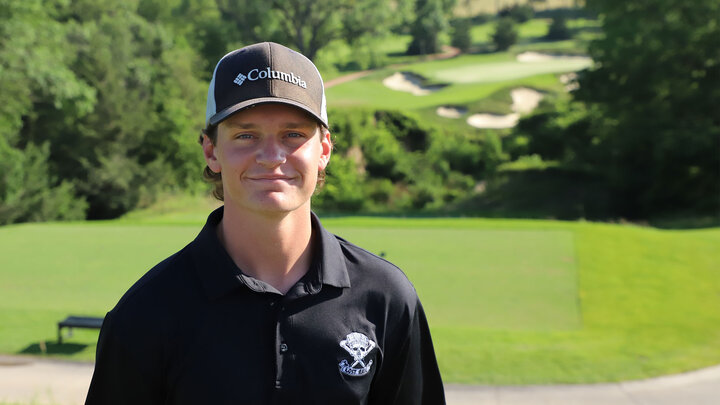Nate Agosta, a junior plant and landscape systems major at the University of Nebraska–Lincoln, says he’s fortunate to intern this summer at Lost Rail, a private golf club near Gretna, Nebraska.
As Agosta gives the grand tour on a golf cart, one can see why. The course, a remarkable 155-acre property with breathtaking views, 40-foot ravines, a 100-year-old railbed and thrilling holes, is the brainchild of golf course architect Scott Hoffman.
Agosta, who chose the turfgrass science and management option in PLAS at Nebraska, is shadowing the club’s superintendent, Ahren Wonderlich, and working with the agronomy team. He has gained extensive hands-on experience, including operating a Toro Turf Sprayer equipped with new GPS technology, learning the process of mixing chemicals and understanding when and why to use them, as well as installing sod and irrigation systems.
Two different cultivars of creeping bentgrass are used on the course. Agosta said both are premium seed varieties that develop a very deep root system. The fairways and tee boxes are a cultivar called 007, and Pure Distinction is used on the greens.
Agosta uses time domain reflectometry to measure moisture or volumetric water content.
“On the greens we aim for about 12%, however, I have seen that number be near 4% without showing any signs of stress,” he said. “So, these [cultivars] have handled drought conditions here in Nebraska well because of their established root system and other qualities.”

Nate Agosta, a junior plant and landscape systems major, hand waters recently-installed Kentucky bluegrass sod near the clubhouse at Lost Rail Golf Club near Gretna, Nebraska, where he interns.
Not only has Agosta received professional work experience, but he feels the management has demonstrated appreciation for the work of the agronomy team by gathering the maintenance crew for social events — two golf outings and a July 3rd cookout.
“I've learned a lot throughout this experience; however, my biggest takeaway is ways to create a strong culture,” he said. “The golf course maintenance industry can take its toll on individuals, especially those who are only working here for a seasonal job. Ahren and the management team have created a welcoming, fun and efficient environment. I’ve noticed this is created by giving constructive feedback, being prepared and organized and hosting events.”
He was able to work with assistant superintendent Matt Petrick, who taught him about irrigation and construction management. He also worked with assistant superintendent Steve Merkel, a Nebraska turfgrass science alumnus with extensive experience in the industry. From Merkel, he learned the process of mixing chemicals.
“I operated the turf sprayer, allowing me to see how the newer models are programmed to spray specific, mapped-out spots,” he said.
As for the future, Agosta’s goal is to become a golf course superintendent.
“This job position isn’t just given out, so I plan to become an assistant superintendent somewhere and keep learning to prepare myself for when the opportunity presents itself.”

Lost Rail Golf Club Assistant Superintendent Steve Merkel (from left) and University of Nebraska–Lincoln Professor of Practice Anne Streich, both Nebraska turfgrass science and management alumni, pose for a photo with Nate Agosta, student intern, at hole 12 overlooking the clubhouse.
Student summer internships are required by the Department of Agronomy and Horticulture faculty due to their experiential component and educational value. This summer, 94 agronomy and horticulture students are working jobs for credit related to their major, gaining invaluable knowledge and real-world experiences.
“Internships allow students to connect knowledge from their coursework to professional work experiences, broaden their professional network and gain different perspectives within their professional field,” Professor of Practice and Student Adviser Anne Streich said. “Often internships lead to full-time positions or another internship opportunity for the following summer.”
More photos at IANR told with Exposure.




